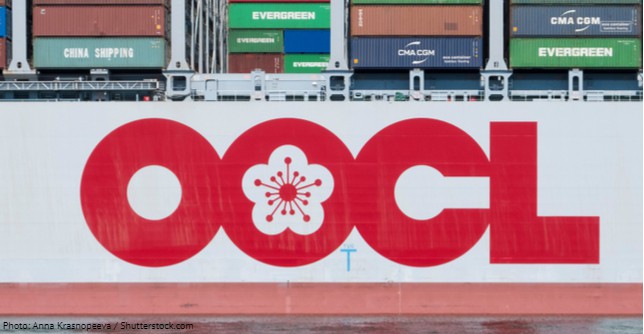OOIL reported a profit attributable to equity holders of $108.2 million in 2018 compared to $137.7 million the previous year despite higher operating profits and revenues.
Orient Overseas International Ltd. (OOIL), the parent company of container carrier Orient Overseas Container Line (OOCL), reported Monday a profit attributable to equity holders of $108.2 million in 2018, which was about $30 million less than the $137.7 million reported in 2017.
OOIL reported an operating profit of $262.94 million on revenues of $6.57 billion in 2018, compared to $238.16 of operating profit on $5.98 billion in revenues in 2017. Compared to 2017, the Hong Kong-based company in 2018 had more than $100 million in additional business and administrative expenses ($550.73 million), nearly $46 million more in finance costs ($143.2 million) and about $46 million more in taxation ($58.62 million), but it made $32.72 million from discontinued operations in 2018 compared to an almost $10 million loss the previous year.
“Looking back to 2018, the global economy continued to recover, but growth momentum slowed down,” OOIL said in a press release. “Several negative economic factors, such as the concentration of vessel deliveries in the first half of the year, the significant rise of the oil price and escalating trade frictions, resulted in a decrease in the overall financial performance of the container liner industry as compared to 2017, especially in the first half of the year.”
OOIL was acquired by COSCO in July, which made the combined companies the world’s third-largest container carrier. The combined group operated a fleet of 477 container vessels with a total shipping capacity of 2.76 million TEUs with an orderbook of nearly 180,000 TEUs as of the end of the year, OOIL said.
OOCL lifted a reported 6.7 million TEUs in 2018, which was up 6.3 percent from the 6.3 million TEUs in 2017. The company also took delivery of the sixth and final 21,413-TEU ship from South Korea’s Samsung Heavy Industries Shipyard in 2018. No orders for new buildings were placed during the year.
OOIL said 2018 was another “year of strong growth for OOCL, especially in the Asia-Europe and transpacific trades.” OOCL’s liftings increased 14.5 percent on Asia-Europe, marking the second straight year of double-digit growth, and 8.9 percent on transpacific. The growth of both trade lanes outpaced the volume growth seen in the market as a whole for the second straight year, OOIL said.
“As we approach the end of the second year of operation of the Ocean Alliance, we can clearly feel the benefits that alliance membership brings in terms of network planning, network scope, vessel utilization and the management of business risk,” OOIL said. “With plans for the third year of the alliance’s operation already well advanced, we look forward to further benefit.”
The company expects to sell its interest in the Long Beach terminal in the coming months, it said in the statement. The terminal had a strong performance in 2018 as its second phase reached its first full year of being operational, according to OOIL.
OOIL is “cautiously optimistic about the global economy and the shipping environment as both challenges and opportunities are lying ahead” in 2019, it said.
Challenges include a slowdown of the global economy, uncertainties facing shipping, such as trade frictions and oil prices, and the industry’s supply and demand imbalance. Positive factors include the stability of China’s economic growth factors and the slowdown of container shipping’s capacity growth, which may help alleviate pressure on the supply side.
“In the new year, OOIL, as an integral part of the container shipping business of China COSCO SHIPPING Group, will, together with parties from various fields, continue to work proactively and diligently, constantly improving development quality, offering customers ever-improving services and creating greater value for our shareholders,” the company said.











